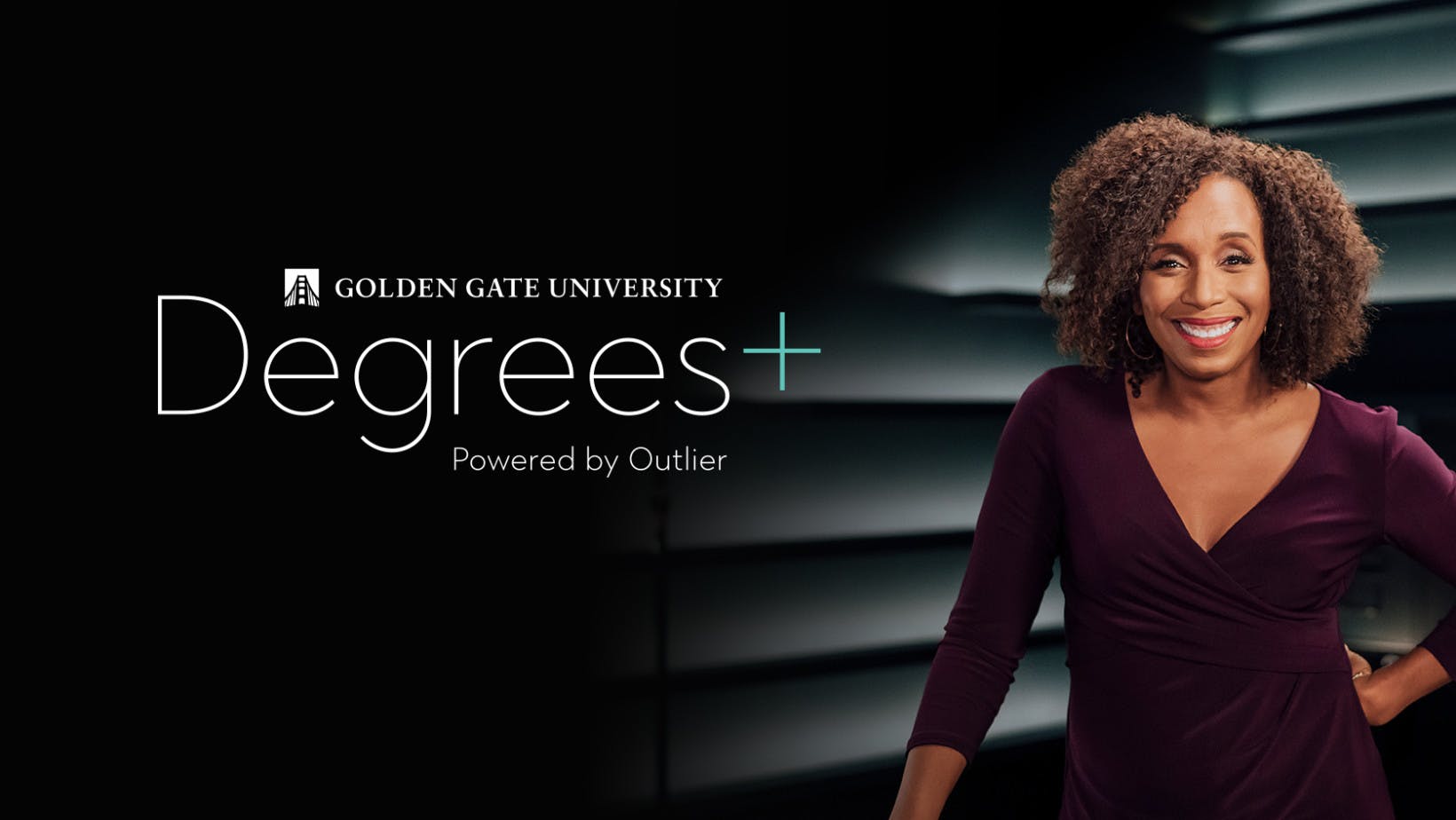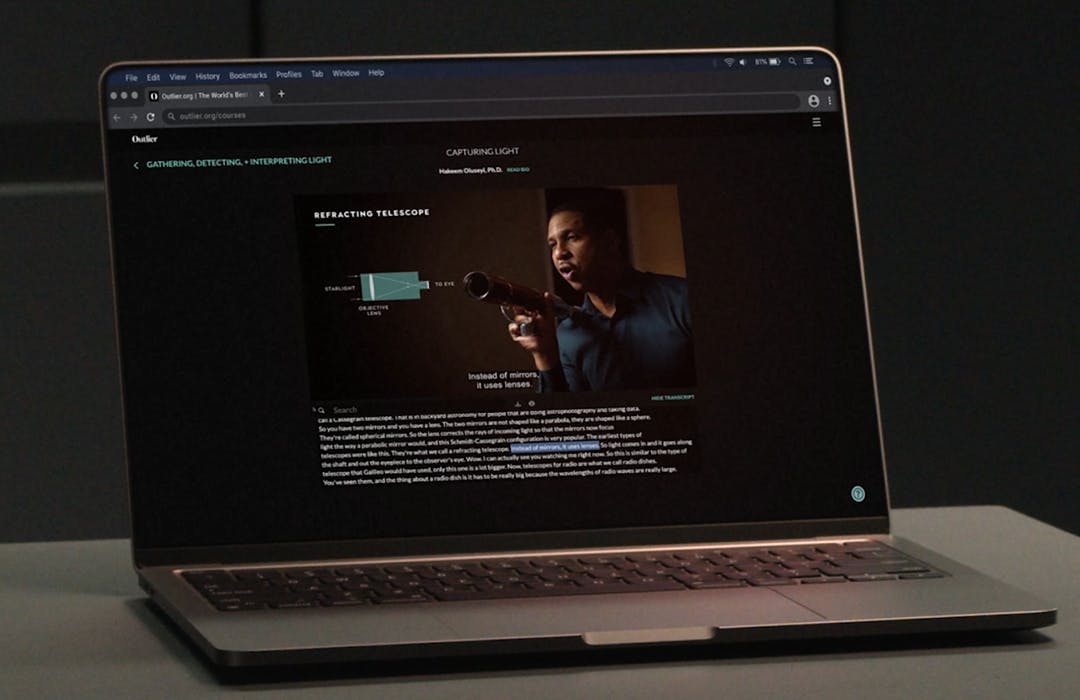In This Article
How Courses Work
Flexible Schedule That Fits Your Life
Extensive Online Support
3 Tips From Past Students
Over 20 million students are currently pursuing a college education. In fact, more than 50% of college students took at least one college course online in 2019 prior to the COVID-19 pandemic.
Online learning is becoming very popular due to its:
Flexibility
Affordability
Ease of access
Unfortunately, most online courses try to recreate the in-person class experience, instead of reimagining learning for a modern digital environment. So students sit through boring lectures and awkward Zoom calls, pay extra for traditional textbooks, and rearrange their lives to accommodate rigid class schedules. But it doesn’t have to be that way.
Outlier.org has teamed up with Golden Gate University (GGU) to create Degrees+, a world-class educational experience unlike other online programs.
The GGU Degrees+ program, powered by Outlier, offers students the opportunity to earn an associate degree fully online for one-third the national average college tuition. Plus, students earn a choice of resume-building career certificates from top tech companies like Google, IBM, and Meta. All GGU Degrees+ courses are taught by passionate instructors at Golden Gate University. Cinematic video lectures and interactive course materials make online learning an engaging experience.
Let’s take a closer look at a day in the life of a Degrees+ student.
How Courses Work
Each Degrees+ course is built to ensure students are active learners in their own education. Educational research shows that by incorporating active learning strategies, student learning experiences are significantly enhanced. And Outlier has the results to prove it: Outlier success rates are proving to match or even exceed IRL courses—unprecedented in the world of online college.
So what does active learning look like in a Degrees+ program?
On-Demand Lectures
Created by a team of educators and filmmakers, all course lectures use cinematic video that creates an immersive experience—like going to the movies. You can watch (or re-watch) these lectures at any time throughout the course.
Based on your preferences and learning styles, lectures can be sped up or slowed down similar to podcast or audiobook apps. Each video also has searchable transcripts so you can jump to any point in a lecture.
All lectures up to the midterm exam are released on the first day of enrollment. Additional lectures are released after completion of the midterm.
Guided Notes
Notes for each lecture are already taken for you so you can focus 100% on the lecture itself. But some details are left blank for you to fill in—an evidence-based strategy to help you retain what you learn.
You can then go back and review these notes at any time. You can also use embedded Quizlet sets to review and study key terms and ideas.
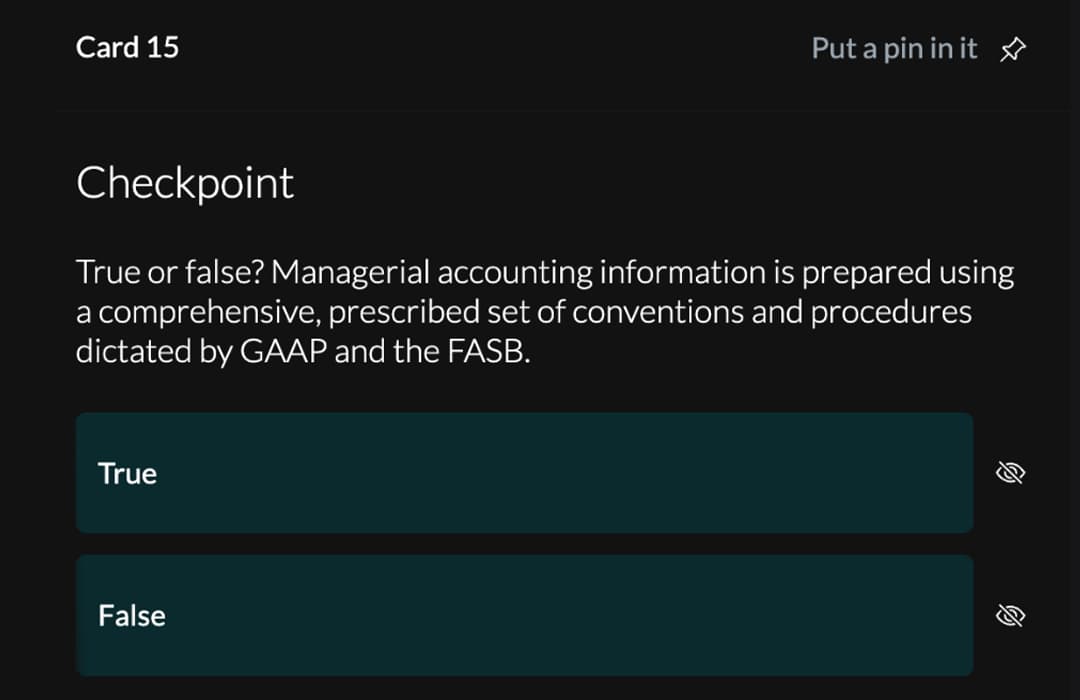
Active learning checkpoint
Interactive Readings
The active learning-powered textbook included in each course brings content to life by using:
Interactive graphs
Animated gifs
Memes
YouTube videos
These interactive tools are built by game designers and education experts to maximize comprehension and retention. You must answer key questions correctly before moving on to the next section.
Quizzes
Within each Degrees+ course are problem sets and practice exercises to ensure students are grasping the content. When you answer a question, you will receive immediate feedback. You’ll know if you got it correct or not, and a detailed response will tell you more about each answer.
One of the best ways to learn is from your mistakes. So Degrees+ quizzes can be taken up to five times. Only the highest score is counted toward your grade, removing some of the stress that often arises from taking assessments.
Tests
With exams, students will also be given immediate feedback on their responses. Midterms and final exams must be taken during a specific week-long testing window depending on the course you are taking. Typically there are two midterms and one final in each course (but this can vary course-to-course).
All non-writing courses have multiple choice exams, while in writing courses, you will typically submit an essay instead of an exam.
Unlike quizzes, exams do not have multiple attempts, so studying is crucial. Students have access to all lecture notes, lectures, and Quizlet sets to help prepare for exams.
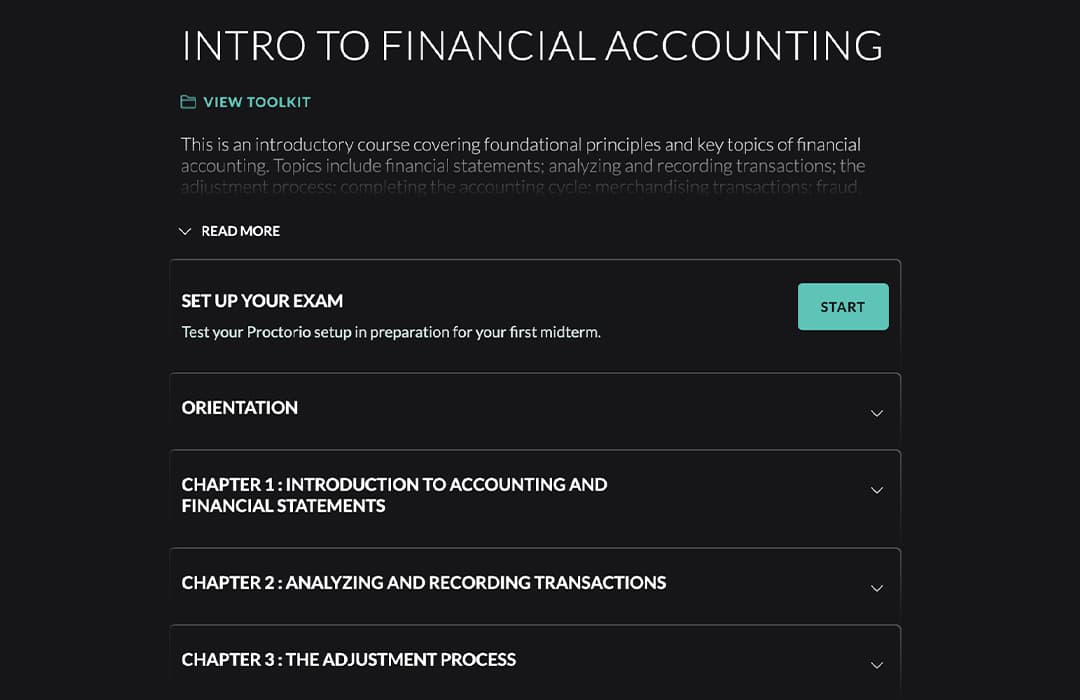
Landing page for Intro to Financial Accounting
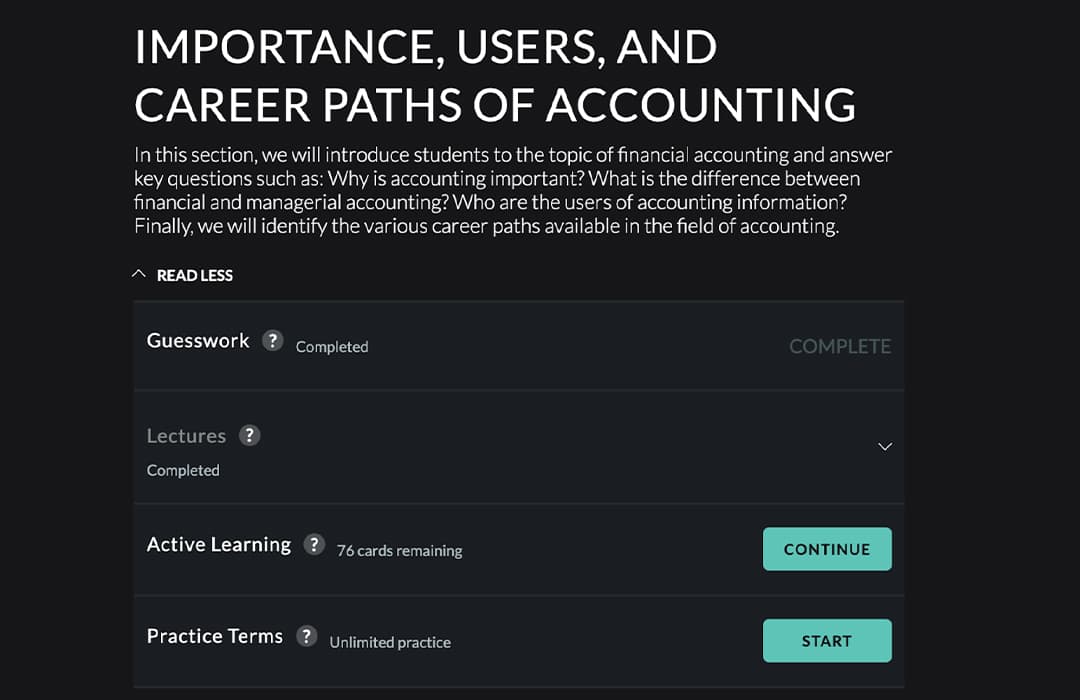
Course section page
Flexible Schedule That Fits Your Life
Creating a healthy school-life balance means having time to focus on your studies and time to focus on yourself and your needs. There is a big difference in the way you feel when you have a healthy school-life balance.
According to Johns Hopkins, “having a school-life balance is important for optimal academic functioning.” By focusing too much on one side or the other, students are endangering their well-being or academic performance.
A healthy school-life balance means:
Attending all lectures
Having focused time to study
Maintaining a full-time or part-time job if desired
Spending quality time with friends and family
Being able to get some exercise each day
Taking a pause to relax and destress
Getting a good night’s sleep every night
The self-directed learning style of Degrees+ lends itself well to a healthy school-life balance. By taking coursework on your own time, you get to choose when and where you learn best.
Degrees+ gives students flexibility with:
3 start dates each year to choose from
Full-time or part-time enrollment options
Lectures available on demand, 24/7
Week-long testing windows instead of firm dates
A dedicated student success team that’s available to answer questions any time they come up
Each course has an average time commitment of 10-20 hours per week, depending on the course and the student. Since these courses are asynchronous, you can arrange these hours of study to fit your unique needs.
Extensive Online Support
Having an academic community gives students a place for both support and guidance when things get tough, which inevitably happens in college. This is why Degrees+ students can reach out anytime to get the help they need.
A variety of support options are embedded in each course:
1. Academic Advisor
GGU Degrees+ students have an academic advisor to guide them throughout the program. Your personal advisor helps you work toward your goals and navigate any challenges along the way.
2. Instructors
The experienced GGU instructors who teach courses are hand-picked for their ability to connect with their students. These passionate teachers bring subjects to life and strive to make learning fun for all students. And if you have questions, ideas, or just want to talk, they make themselves available to students every week via virtual office hours.
3. Dedicated Student Success Team
For those issues that arise, the Student Success Team is there to help. You can pose general questions to support staff, who will get back to you within 2-3 hours, 7 days a week. The Student Success Team will also remind you of important deadlines and assignments so you don’t miss a thing.
4. Math Tutoring
Subject matter experts are available in 1:1 video tutoring sessions for specific content questions. Each Degrees+ math course includes free access tutoring to ensure you fully understand the course concepts.
Each student cohort has a discussion message board. Here, students can ask questions, discuss material, and network with other students. This way, students are learning with other students in a community that supports each other.
Study groups are an effective way for students to learn and ask questions when they arise. By engaging in a learning community and having regular academic discussions, students are more likely to store the course content in their long-term memory.
Outlier uses YellowDig and Discord as community tools to bring students together throughout the Degrees+ program. By using these resources, students create long-term relationships with other students in their college community.
6. Help Center
This is where students can go to see FAQs posed by other students and find the answers they need quickly. The Help Center contains information that spans from study skills to technical questions.
3 Tips From Past Students
Deciding to take on a college education is a big decision. Past Outlier students provide three pro-tips for prospective students:
1. Make a schedule
Time management is important when taking college classes, especially when they’re from the comfort of your home. By making a college schedule and sticking to it, you will make time for all the things in your life that are important.
Having the time to study for classes and hang out with friends needs to be included in this schedule. You will benefit immensely by listening to your needs and making time for what is important.
2. Read the syllabus
The syllabus for each course gives you all the information you need to be successful in that course. This includes:
Important dates
Assignment details
Contact information
By reading the syllabus, there won’t be any surprises during the course. This ensures you are organized and prepared for the work that lies ahead.
3. Join a study group
Going to college online can seem isolating. Having other students to learn from will help you understand the concepts and bring normalcy into your school life.
While discussion groups in Degrees+ courses are mandatory, forming a study group will help you talk through difficult concepts and get other points of view on assignments.
Degrees+ Enrollment Is Open
With its high quality, affordability, and flexibility, Degrees+ makes an excellent choice for pursuing your college degree while earning a job-ready certificate from top tech companies like Google along the way. Learn more about the Degrees+ programs available in three in-demand majors, and apply online in just 15 minutes.
Degrees+: Discover Online College Unlike Anything You’ve Experienced
Outlier (winner of TIME Best Inventions 2020) and Golden Gate University (#1 school for working professionals) have redesigned the experience of earning a college degree to minimize cost and maximize outcomes. Explore a revolutionary way to earn your college degree:
